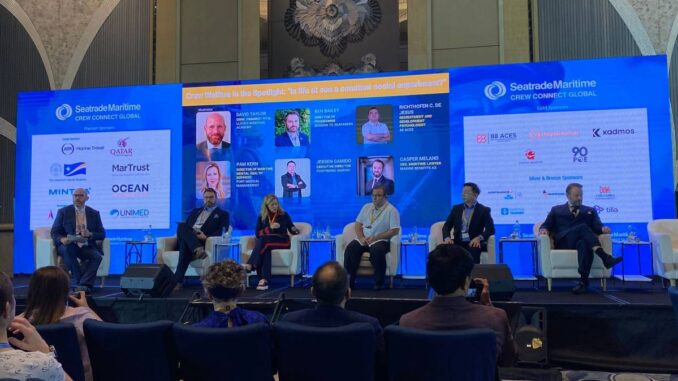
HOMOSEXUALITY is not always a welcome, delightful thing in workplaces, especially in a male-dominated, brawn-intensive industry such as maritime.
This was affirmed by manning leaders during an open discussion on Crew Welfare at the Seatrade Maritime Crew Connect Global 2024.
The panel included directors, leaders and psychologists from 88 Aces Maritime Services, Lloyd’s Maritime Academy, Mission to Seafarers, Port Medical Management, Marine Benefits AS and Positibong Marino, among others.
The topic of homosexuality is an open discussion on Crew Welfare at the Seatrade Maritime Crew Connect Global 2024, with a panel that includes directors, leaders and psychologists from different groups such as 88 Aces Maritime Services, Lloyd’s Maritime Academy, Mission to Seafarers, Port Medical Management, Marine Benefits AS, and Positibong Marino. PHOTO by WILMAR ALMERIA
It was the first time in the 25-year history of Crew Connect that LGBTQ concerns were explicitly discussed.
Such reality poses a challenge, however.
Based on an article by the Human Dignity Watch, there are at least 63 countries that have national laws criminalizing same-sex relations and 14 countries that criminalize forms of gender expression that target transgender and gender-nonconforming people.
Such laws present severe consequences, such as the death penalty, serving to justify discriminatory treatment.
The panel of speakers on Crew Welfare emphasized that a global industry such as shipping is faced with the norm of having seafarers from different countries, cultures, traditions, and sexual orientations working and living together on board for almost a year on end.
“There are so many countries where being gay is illegal. This is where the stigma starts,” Ben Bailey, director of program of the Mission to Seafarers, observed.
Jebsen Gamido, founder and president of Positibong Marino, a former seafarer, and advocate of maritime LGTBQ rights discussed in length how inclusivity and respect for all genders can be promoted while onboard.
“This is a controversial issue, especially with those with a conservative outlook,” Gamido said.
He shared his personal experience onboard of being bullied and harassed for being gay.
“With their desire to fit in, some seafarers with different sexual orientations would rather conceal who they are. Thus, they cannot fully express themselves and, in turn, hinder their true potential. Coming out entails fear of rejection,” he explained.
“Crew welfare is at the core of the manning sector. If there is no sense of belongingness amongst our crew, then we fail. Unconscious biases have to be unlearned to move forward. The human element has to be taken at the forefront,” he stressed, adding that embracing uniqueness can also be seen as a strength.
This was echoed by Casper Meland, maritime lawyer of Marine Benefits AS. He emphasizes the importance of building an environment of mutual respect for all genders onboard ships.
“There is a difference [between] just having a policy and implementing it to the organization and ship. We must build psychological safety amongst the crew and show that we mean it,” he said.
“Don’t let the differences make a difference. Psychological safety is being yourself without the fear of being rejected or punished,” agreed Pam Kern, director of maritime mental health services for Port Medical Management.
“Don’t just identify what makes them different; look at the person’s commonalities with others. Include them in the progression and let them express themselves. We can only see competency by being inclusive,” concurred Richthofen De Jesus, recruitment and development psychologist of 88 Aces.


Be the first to comment